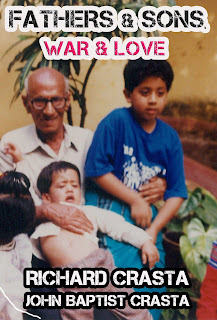Railway Man, Forgiveness, and "Eaten by the Japanese"
I just saw Railway Man, the movie based on the bestselling book: the true story of Eric Lomax, a former British prisoner-of-war who decided to confront his nightmares by confronting his Japanese torturer, Takashi Nagase, in the flesh. It's a fascinating movie, with a surprising ending. In fact, most reviews of this movie do hint at the ending, so the story is actually in the telling, in the progress of Lomax from fury and terror to forgiveness and understanding.
In Eaten by the Japanese: The Memoir of an Unknown Indian Prisoner of War, my late father, John Baptist Crasta, tells his own story. For him, the only possible therapeutic outlet was the act of writing the book. He, like thousands of other Indians, some dead, never got to meet the Japanese who ill-treated him.
However, the Indians did engage in a form of forgiveness, as shown in this section from my father's book:
What happens in Railway Man [where the sadistic scenes are extended well beyond my taste--I would have gotten the point with 70% less violence] is much more profound. The British POW, Lomax, finds that his Japanese torturer has already been suffering for his crimes, and has been engaging in a form of atonement by being a tourist guide to the Kanchanaburi War Museum. When Eric approaches Nagase with a knife, and with the intention of killing him, Nagase's response is humble, accepting, and deeply remorseful. In the process, they both discover the larger forces that had made them behave as they did. The surprise ending is this: They become friends for life.
Forgiveness is a good thing, but it needs to be preceded by a modicum of giving witness, of acknowledgment, atonement, and regret. As for the tens of thousands of Indians, and other Allied soldiers, who were either killed, tortured, or imprisoned in the Pacific theater of World War II, particularly in the area of Papua New Guinea, very little regret has been expressed, and most people are still unaware that it happened at all. Even a distinguished and senior American journalist, who knows quite a bit about the world and its recent history, was surprised that Indians were taken prisoner to Papua, New Guinea. Most of the survivors returned to India to have their contributions or their sufferings unacknowledged, and lived hard lives till they died. Therefore, the only thing I, as a son, can do, is to continue to tell my father's story and to make it available to those who wish to read it.
In Eaten by the Japanese: The Memoir of an Unknown Indian Prisoner of War, my late father, John Baptist Crasta, tells his own story. For him, the only possible therapeutic outlet was the act of writing the book. He, like thousands of other Indians, some dead, never got to meet the Japanese who ill-treated him.
However, the Indians did engage in a form of forgiveness, as shown in this section from my father's book:
My father once told me that he was one of the people urging his colleagues to forgive and to be generous in their victory.
On 27 August, we were taken to Romali, about thirty miles from Rabaul, to be “handed over.”
Romali turned into a collection point for all Indians in the vicinity. The Japanese left us there and departed — for good. Our three-and-a-half-year connection had finally ceased.
The Japanese who were in charge of our group HQ were stationed in Romali. Among others, they included Hiroshima Thai, Oobayashi Juni [Warrant Officer Oobayashi], Nakamura Socho [Sergeant Major Nakamura], Kabutha Chuui [First Lt. Kubota], et al. As an old revenge, Indians robbed their belongings and beat them up. The Japanese fled in fear of their lives, but as they had nothing to eat, they returned on the third day. They pleaded with the Indians to spare them, expressing profound regret for having ill-treated Indian prisoners. They were again beaten, but before they left, they were given food and assured that in future no harm would be done to them. The Japanese, having no clothes, bedding, or food, visited us again and again. Indians were by now moved to pity, and treated their former enemies with hospitality. [emphasis mine]
What happens in Railway Man [where the sadistic scenes are extended well beyond my taste--I would have gotten the point with 70% less violence] is much more profound. The British POW, Lomax, finds that his Japanese torturer has already been suffering for his crimes, and has been engaging in a form of atonement by being a tourist guide to the Kanchanaburi War Museum. When Eric approaches Nagase with a knife, and with the intention of killing him, Nagase's response is humble, accepting, and deeply remorseful. In the process, they both discover the larger forces that had made them behave as they did. The surprise ending is this: They become friends for life.
Forgiveness is a good thing, but it needs to be preceded by a modicum of giving witness, of acknowledgment, atonement, and regret. As for the tens of thousands of Indians, and other Allied soldiers, who were either killed, tortured, or imprisoned in the Pacific theater of World War II, particularly in the area of Papua New Guinea, very little regret has been expressed, and most people are still unaware that it happened at all. Even a distinguished and senior American journalist, who knows quite a bit about the world and its recent history, was surprised that Indians were taken prisoner to Papua, New Guinea. Most of the survivors returned to India to have their contributions or their sufferings unacknowledged, and lived hard lives till they died. Therefore, the only thing I, as a son, can do, is to continue to tell my father's story and to make it available to those who wish to read it.

Comments